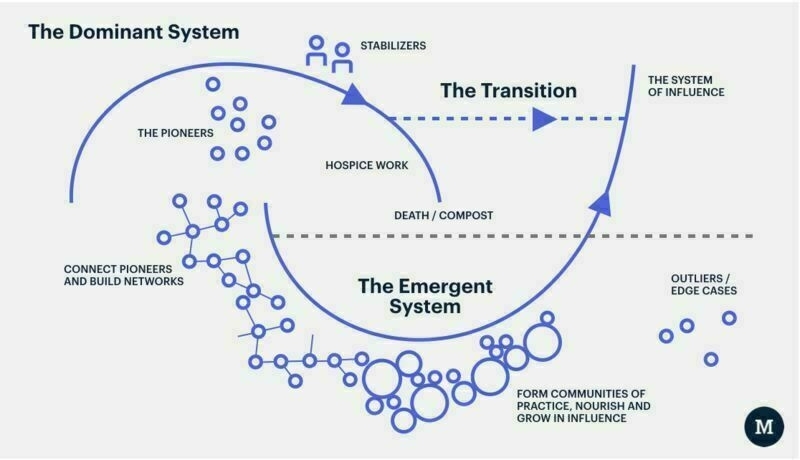A bit of composting

There’s a lot of people thinking about endings at the moment. Not just because we’re getting into the post-Covid era now, but also due to things like the huge swathes of layoffs in the US, and the general economic downturn in the UK and other countries.
Things start and things end. That’s what they do. Change is constant, which is something difficult to get used to. In this post, Tom Watson talks about ‘composting’ which is a key part of the Berkana Institute’s Two Loops model, which he doesn’t actually reference but is extremely relevant.
I’d also say working openly helps with having good endings. The chances are that what has been learned during the project can take root elsewhere, and therefore live on, if people can see into the project. We should treat projects less as raised beds for pretty flowers and more like mycelium networks.
I thought about the social enterprise I had with my dad. I’ve got lots of things wrong in life, but doing that definitely wasn’t one of them. I learned a lot, about caring, kindness, not following the bullshit, and community. It ended, like all organisations do. But I was proud that we were able to financially support a group to continue meeting and chatting, and supporting each other. It wasn’t much, but it was something. And just last year we donated the last of our funds, around £6k, to a charity rewilding in Scotland, where the C for Campbell in my name comes from via my dad.
This felt like a good ending. A bit of composting. But not every organisation can pass on finances at the end, in fact it’s pretty rare, because often the root cause of the ending is money. But that doesn’t mean they don’t have things of value to pass on. They have resources, knowledge and wisdom. And I couldn’t help thinking about all that is lost, again and again when things end.
[…]
[W]e need to think broader about endings and composting. Not just when an organisation ends, but when programmes and projects end. What about all the research reports, the data from projects, the experiments that worked and those that didn’t. What about all that knowledge, what about all that potential wisdom. It’s why we spend time up front cataloguing all the things we do in a project along the way. It’s not perfect, but it’s something.
Source: Tomcw.xyz
Image: Innovation Unit